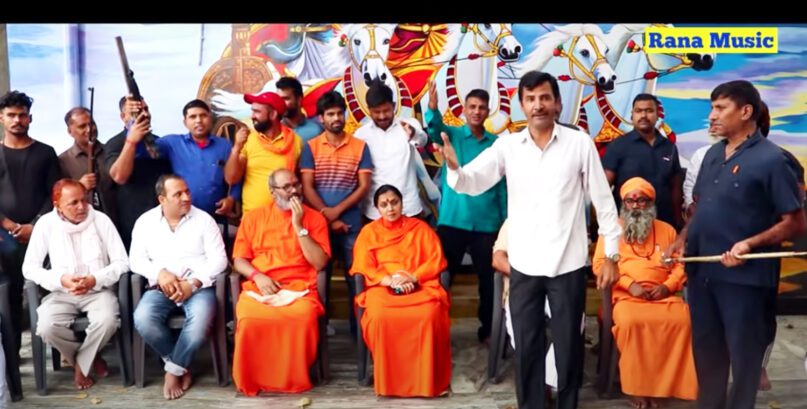(RNS) — Upendra Rana, a singer-songwriter based in the north Indian state of Uttar Pradesh, started by performing at low-key events in and around his village of Rasulpur before launching his YouTube channel in 2019. Since then the unassuming, middle-aged Rana, whom one Indian publication described as dressed like a bank clerk, has amassed close to 400,000 followers, with some of his songs attracting millions of views.
His secret? Rana is a star in an incendiary genre referred to as “Hindutva pop” that paints Muslim Indians as villains who should move to Pakistan, India’s Muslim-majority neighbor.
In a video made last year, Rana is seen praising Yati Narsinghanand Saraswati, a powerful Hindu priest who openly calls for genocide of Muslims and creating an Islam-free India — in a song about the “resurgence” of a Hindu nation.
Rana is unapologetic about anti-Muslim hatred in his songs. “They (Muslims) can’t stand the truth,” he told Religion News Service. “They can say anything about our gods and expect us to be mum. Even then, we are not as violent as them.”
RELATED: How American couples’ ‘inter-Hindu’ marriages are changing the faith
At the same time, he dismisses the idea that his songs are offensive. “I talk about the glorious Hindu kings of the past. Most of their opponents were Muslims. So, whenever I talk about them their opponents would be mentioned. So what’s the harm in that?” he asked.
But many observers say the increasingly popular genre, which emerged after the Bharatiya Janata Party won national elections in 2014, is triggering violence against Muslims, a minority already marginalized by Hindu nationalists with support from the BJP government.
Abhay Kumar, a journalist and activist in New Delhi, believes that Hindutva pop is sponsored by the nationalist government itself. “These songs have led to increased polarization of masses and helped in creating an atmosphere of fear for minorities. Such an atmosphere is beneficial for a few political parties in the country for their electoral gains,” he said.
Sending Muslims to Pakistan is a prominent theme. “Muslalmano ke do sthan, ya Pakistan, ya Qabristan,” goes one popular song — “Muslims deserve only two places, either Pakistan or the graveyard.”
But the threat of Hindutva pop goes beyond taunts and suggestions Muslims don’t belong in India. “These songs have become a precursor to violence against us,” said Amjad Khan, a resident of Khargone, in central India, who watched as a mob whipped up by Hindutva music attacked a Muslim neighborhood there during Muslim-Hindu clashes in April.
Across the “cow belt” — the north and central regions of the country known for their strong tilt toward Hindu conservatism — Hindutva pop has become the soundtrack for anti-Muslim attacks, observers say.
“In many parts where riots took place,” said Aasif Mujtaba, an activist with the Miles2Smile Foundation, which helps rehabilitate those affected by mass violence, “one thing that we found common was that these extremely provocative songs were being played on loudspeakers to mobilize people.”
Pushpak Raja, a creator of Hindutva pop from the central Indian state of Bihar, explains that his mission is to “further the agenda” of India’s ruling Hindu nationalist party.
He has produced songs supporting government measures such as ending the autonomy of the disputed Muslim-majority region of Kashmir in 2019 and the building of a temple to the Hindu god Ram on the site of a demolished 16th-century mosque in Uttar Pradesh.
“I sing about issues that I feel affect the unity of my nation. If someone is eyeing at our nation with wrong intentions, I sing about it,” said Raja.
“The people who consider this land as their mother would always like my songs,” he added.
Umesh Kumar Rana (no relation to Upendra Rana) is another Hindutva pop artist who has found fame. His interest in music was triggered, he said, when his parents taught him to sing Hindu devotional songs when he was growing up in Uttar Pradesh. But the demand for Hindutva pop convinced him to shift his focus a couple of years ago to sing mostly about “Thakur” pride.
Thakurs are a powerful Hindu community who are traditionally considered “warriors” in India’s caste system.
Unlike many of his counterparts, he doesn’t invest in building his YouTube audience. Instead he records on small music labels. Like other Hindutva singers, Kumar believes Muslims have gotten more than their share in the country, and it is important now to talk about the “Hindu” pride.
“We have roads and streets named after (Muslims),” he said. “People sing praises about Muslim medieval rulers, but our Hindu kings are demeaned and downplayed. I am trying to change that with my songs.”
The audience for singers like Rana like both the sound and the message. “I listen to the songs of Upendra Rana bhaiya (brother) and others, as I like them,” Rajesh Mishra, a teenager from the Meerut, in Uttar Pradesh, told RNS. “They are not only fast-paced, the kind of music I like, but also teach us about Hinduism and nationalism.”
RELATED: Dispute over mosque becomes religious flashpoint in India
Mishra said many of his friends have started listening to the genre over the last couple of years.
“It is like learning while listening to music,” Mishra said. “We are being made aware about our history, so why should it bother anyone?”
This article is produced by Religion News Service with support from the Guru Krupa Foundation.





